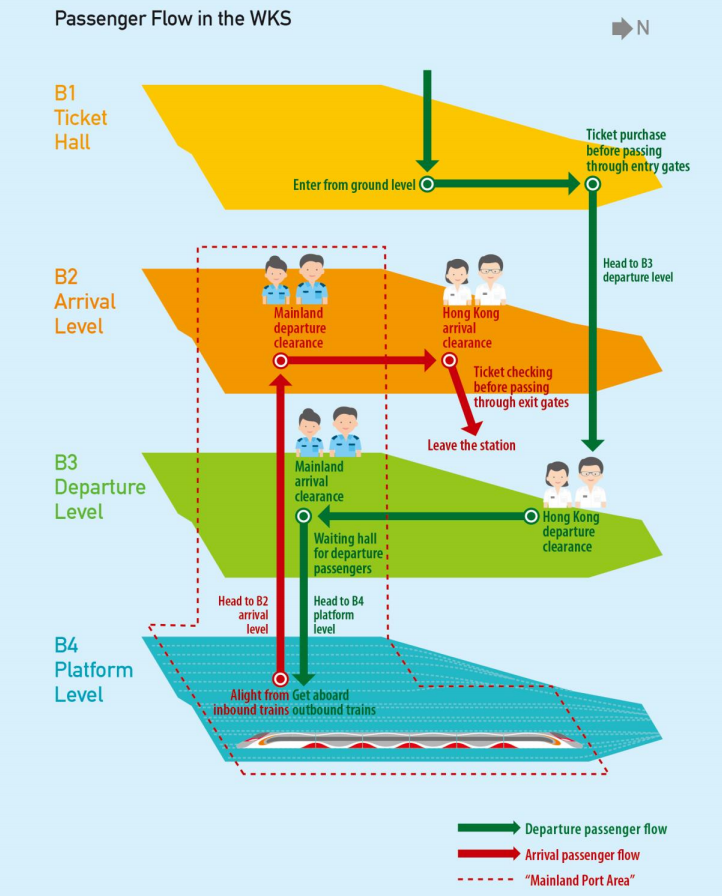The controversial joint checkpoint plan for the HK$84.4 billion Guangzhou-Shenzhen-Hong Kong Express Rail Link has been passed by the Legislative Council after all amendments raised by the democrats were rejected. It was approved with 40 votes in favour, 20 against, and one abstention.
The plan was first proposed in July last year after years of discussion between Hong Kong and the mainland. The rail project is expected to begin operations in September, despite engineering issues such as water seepage and higher-than-expected levels of wear recorded during trial runs.
The pro-democracy camp, as well as the Hong Kong Bar Association, have deemed the legislative bill unconstitutional as Hong Kong is set to effectively give up its jurisdiction across a quarter of the West Kowloon terminus, where immigration and customs procedures will be performed by mainland law enforcement agents. The arrangement was intended for faster clearance so that passengers would not have to leave the train at the border.

Article 18 states that Chinese laws are not to be applied in Hong Kong aside for those listed in Annex III, such as the national flag and emblem law. However, mainland law is set to apply in the Chinese-administered areas of the terminal.
On Thursday evening the pro-democracy lawmakers who were evicted from the legislative chamber led a rally outside the building, condemning Legislative Council President Andrew Leung. A crowd of around 200 attended the rally, which was met by a pro-Beijing counter-protest of about 20 people.
Multiple pro-democracy lawmakers at the rally said they will look into initiating judicial review procedures over Leung’s conduct.
Legal foundation
Last November, the government proposed a non-binding motion to approve the arrangement ahead of a three-step legislative process for the joint checkpoint. The motion was passed despite democrats using unprecedented tactics in protest.
The government first signed an agreement with the mainland. Then, it sought approval from the Standing Committee of the National People’s Congress (NPCSC) – which it granted last December.

Stating that the plan complies with the Basic Law, the NPCSC said in an explanatory document that Article 18 applies to Hong Kong residents, while the application of national laws in the mainland section of the West Kowloon terminal targets railway passengers inside the key area.
“This is different from the situation described by Article 18 on the implementation of national laws in Hong Kong SAR. There is no issue with Article 18 being contravened,” it concluded.
However, the Hong Kong Bar Association – represented many of the city’s top lawyers – have repeatedly said the arrangement has no constitutional foundation and the Legislative Council had no authority to enact it: “None of the provisions in the Basic Law provides the basis or foundation for HKSAR to undertake such ‘de-establishment’,” it said.

The joint checkpoint bill was then introduced to the Legislative Council. During the bills committee stage, the democrats often criticised committee chair Regina Ip for acting like a “thug” in ensuring the bill would be passed.
After the bill was sent to the legislature’s general meeting for final scrutiny, Legislative Council President Andrew Leung set an unprecedented upper limit of 36 hours for the debate and scrapped the majority of amendments submitted by democrats.
Leung also decided to strip 11 lawmakers of their chance to speak during the second reading debate to ensure the debate would finish on time. On Wednesday, he kicked five pro-democracy lawmakers out of the chamber who protested his decision, refusing to allow them to re-enter on Thursday.
Slower than expected
The government has often highlighted the advantages of the Express Rail Link, saying that a direct train could reach Guangzhou in 48 minutes – much faster than current transport options.
But a train on a recent trial run took an hour and 18 minutes to reach the West Kowloon terminus from Guangzhou South station in the outskirts of the city. The existing train service takes around two hours to reach Guangzhou’s central business district.

The ticket price from West Kowloon to Guangzhou South will be HK$260.
However, the MTR Corporation does not have authorisation to sell tickets between destinations which do not involve Hong Kong – meaning passengers will have to pay extra service fees.
Large items of luggage will not be allowed on Express Rail link trains, according to the chair of the MTR Corporation.
